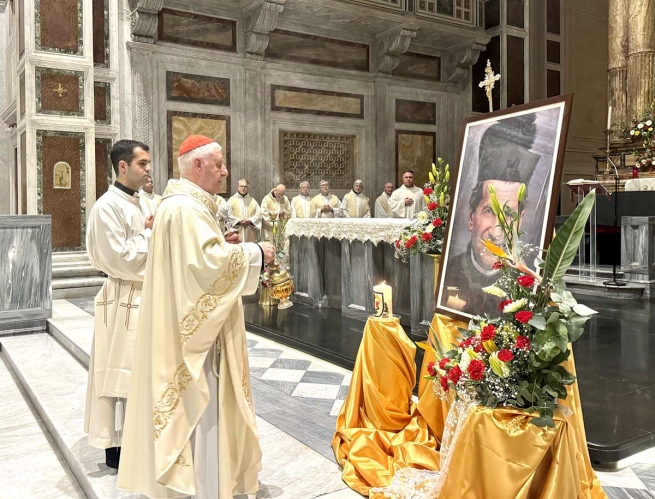The celebration saw a beautiful and rich participation of the General Councillors, many Salesians and many faithful, who came to the Basilica of the Sacred Heart to pay homage to the Saint of Youth.
During his homily, Cardinal Versaldi first urged those present to look with attention and meditation at the witness of St John Bosco, recalling how it is a reflection of God's unconditional love. He then recalled some of Don Bosco's main characteristics, seeking to ‘re-actualise them, re-meditate them and revive them in our hearts’.
‘First of all, we can say that St John Bosco was conquered by God's love,’ said Cardinal Versaldi, ’Before loving others, in fact, we must feel loved by the Lord. And St John Bosco was able to understand for himself, and then transmit to others, the incarnate love of the Lord'.
The Cardinal then dwelt on this aspect of ‘incarnate love’, which Pope Francis has recently taken up, to remind us that ‘it is symbolised by the Heart of Jesus, understood not only as the seat of sentiments, but as the most authentic part of ourselves’. And speaking of the Sacred Heart of Jesus, a reference to the place where the celebration took place could certainly not be missing, namely the Basilica of the Sacred Heart in Rome, for which St. John Bosco worked tirelessly, despite his ill health, at the behest of Pope Leo XII.
The second aspect on which Cardinal Versaldi invited the faithful to reflect was knowing how to give God's love to others. And as everyone knows, Don Bosco poured out his love especially on the young. He, who had experienced the harshness of life, dedicated himself especially to the many poor young people, who lived in misery, despised, isolated, easily led to delinquency. Don Bosco strove to attract young people, to bring them closer to goodness not through a form of coercion, but by giving them a positive example.
‘St John Bosco gave his entire life to the young,’ Cardinal Versaldi stressed, ’With intuition and intelligence, Don Bosco knew how to build a way of educating that gave confidence to the young, even to the most straggling and marginalised, who had no friends and whom no one esteemed.
Much space, during the homily, was given to the birth of the Oratory, a meeting place, a place capable of welcoming all young people and giving them new opportunities, in a context of joy and fun. This focus on joy, Cardinal Versaldi further reflected, bears witness to a refined and positive pedagogy, ‘in times that were instead rather rigorous and pessimistic’.
The third and final characteristic highlighted was the concern for souls, Da mihi animas cetera tolle, ‘because Don Bosco had in mind that the greatest charity is to lead people to eternal salvation’. And so the Oratory becomes a place of prayer and instruction and also an example to follow, even today.
‘We Christians, we believers must cooperate with everyone, even with non-believers, even with state authorities, to promote welfare, health and education. But we cannot limit ourselves to this,‘ Cardinal Versaldi continued, “We must always bear in mind that eternal salvation is the true and supreme good for every creature, and that to the ”corporal’ works of charity we must always unite spiritual works of charity'.
In conclusion, wishing to update Don Bosco's teachings, the Cardinal renewed his exhortation to the Salesians to accompany young people in today's challenges and difficulties. He then recalled that if St. John Bosco met the youth of today - perhaps less poor materially, but poorer spiritually and culturally - he would certainly know what to do, even in the face of the greatest pitfalls.
 Title
Title
Title
Title
 Title
Title
Title
Title
 Title
Title
Title
Title
 Title
Title
Title
Title
 Title
Title
Title
Title
 Title
Title
Title
Title
 Title
Title
Title
Title
 Title
Title
Title
Title
 Title
Title
Title
Title
https://www.infoans.org/en/sections/news/item/23359-italy-the-feast-of-st-john-bosco-at-the-basilica-of-the-sacred-heart-in-rome#sigProIdafa1456d5b


